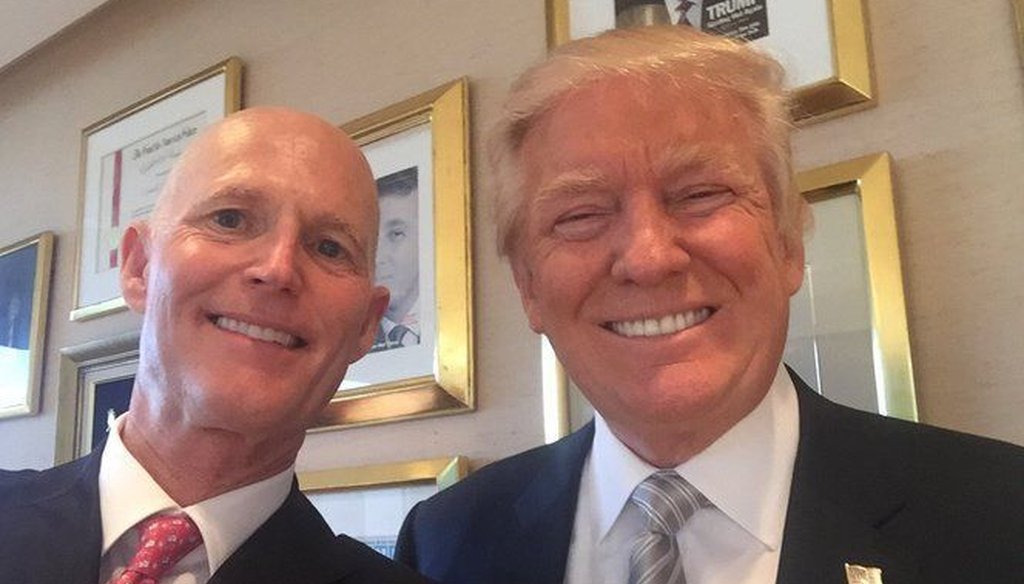Stand up for the facts!
Our only agenda is to publish the truth so you can be an informed participant in democracy.
We need your help.
I would like to contribute
Small gains but no repeal in Rick Scott's Obamacare promise

Florida Gov. Rick Scott and President Elect Donald Trump posed for a selfie in New York in November 2016.
As he leaves Tallahassee for Washington, Rick Scott's fight to repeal the Affordable Care Act is in better shape than when he took office.
The law remains on the books. But one of Scott's major problems with it — the requirement to carry health insurance — is now gutted.
The Republican-led Congress zeroed out the financial penalty for not carrying health insurance in its 2017 tax law.
Scott got part of the outcome he wanted, but it didn't go down the way he planned, and he didn't have much to do with it. (He will have more influence on federal policy soon as an incoming U.S. senator.)
Back in his 2010 campaign, when Democrats controlled Congress, Scott planned to support a constitutional amendment that would ban the individual mandate from being enforced in Florida. The measure was largely symbolic, because federal law supersedes state law. But voters didn't like this idea, rejecting Amendment 1 in 2012.
Scott continued to fight against the Affordable Care Act throughout his tenure, some years more loudly than others, and without a lot of success. He cheered on a multi-state lawsuit challenging the law and the mandate, championed by Attorney General Pam Bondi, but it failed at the U.S. Supreme Court.
In 2017, as congressional Republicans were considering repealing the law, Scott wrote an op-ed that said, "There is absolutely no question that Obamacare must be repealed immediately so Americans can actually afford to purchase health insurance."
Congress never agreed on a plan to repeal and replace Obamacare, but in the 2017 tax law, it did reduce the penalty for not having insurance to zero.
That policy prompted another multi-state lawsuit signed by 18 Republican attorneys general — including Florida's Bondi — challenging Obamacare's legal status without the mandate. In December, a federal judge in Texas struck down the entire law, concluding that the Affordable Care Act cannot stand without an individual mandate. The lawsuit does not immediately affect patients enrolled under the health care law and due to expected appeals, the final outcome may not be known until 2020.
With Democrats soon to take control the House, there is no chance that the law will be repealed for the next two years. (The renewed legal battle is another story.) But Floridians no longer have to give the individual mandate a second thought.
We rate this promise Compromise.
Our Sources
Miami Herald, "Florida's Rick Scott says he's helping Trump craft replacement health care plan," Jan. 18, 2017
USA Today Network, "Health care bill defeat was a loss for Rick Scott," March 26, 2017
PolitiFact's Trump-O-Meter, Repeal Obamacare, Dec. 21, 2017
PolitiFact, "Veterans group attacks Rick Scott's Navy hat, former health care company's fraud settlement," Oct. 23, 2018
PolitiFact, "Fact-checking Rick Scott and the risk to pre-existing condition protections," Sept. 12, 2018
New York Times, "Scholars Say Ruling On Health Law Rests On Shaky Ground," Dec. 16, 2018
New York Times, "Texas Judge Strikes Down Obama's Affordable Care Act as Unconstitutional," Dec. 14, 2018
Interview, McKinley Lewis, Gov. Rick Scott spokesman, Nov. 28, 2018
